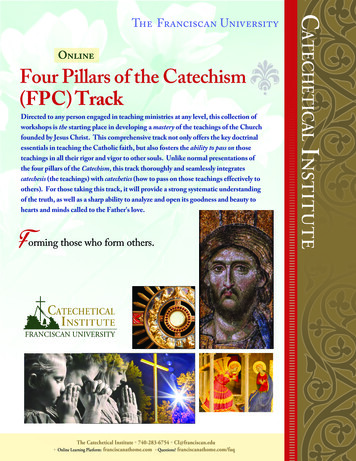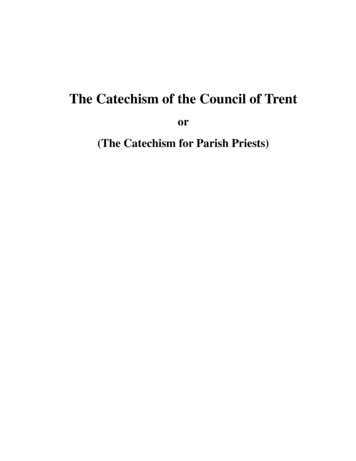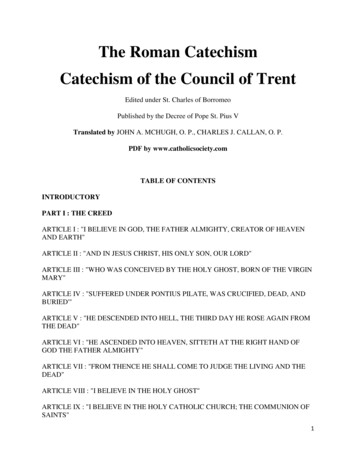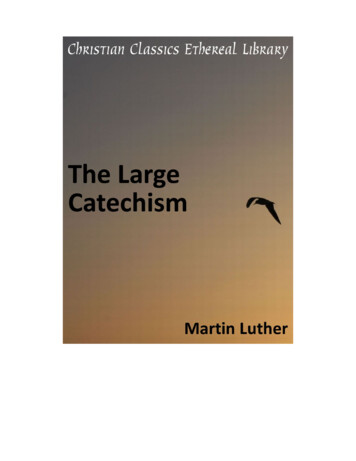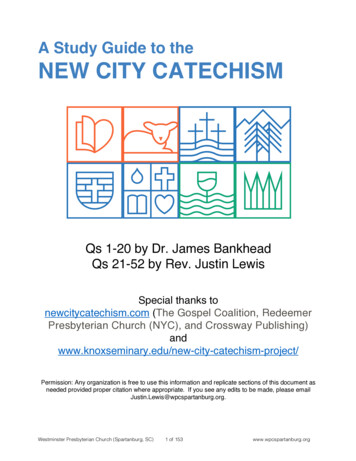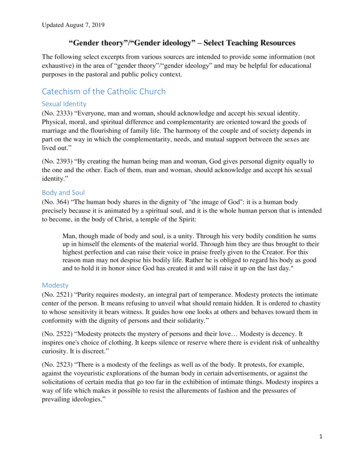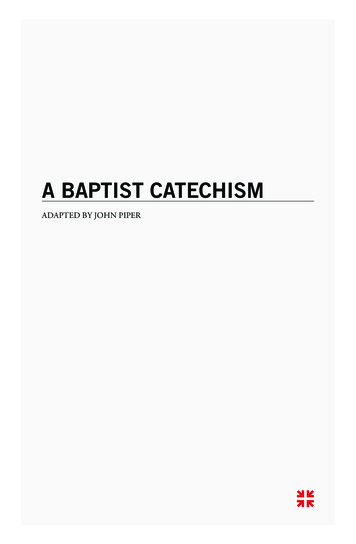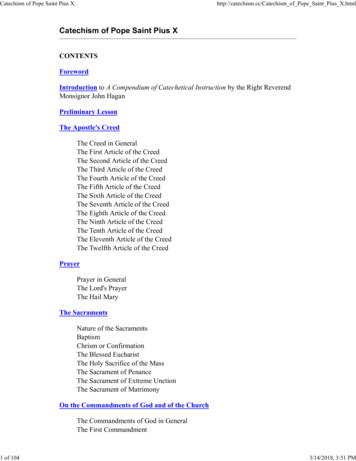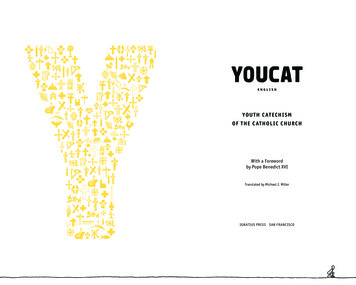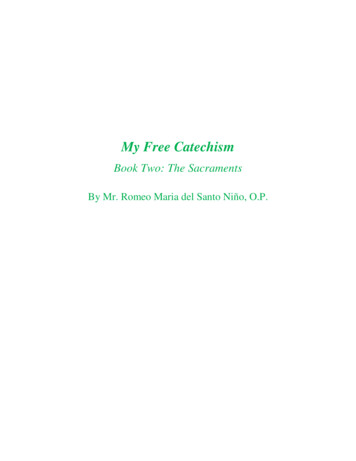
Transcription
My Free CatechismBook Two: The SacramentsBy Mr. Romeo Maria del Santo Niño, O.P.
2 2020 by Mr. Romeo Maria del Santo Niño, O.P. – All rights reserved.www.thetheologycorner.comemail: romeomariadsn@gmail.com
3IMPORTANT NOTICE!This catechism is intended for educational, home use. It is copyrighted,but FREE. You may freely copy and distribute each book of thiscatechism to friends and family, provided the entire book (not portionsor parts of it) is copied and distributed, no alteration is made, and thisnotice is kept intact. The sale of this catechism is strictly prohibited.This catechism is intended as a supplementary learning material forchildren in the upper grades, but is substantial enough to be usable alsoby young adults and the general public. It also aims to serve as a freeresource for many average Catholics who need to learn or review whatthe Catholic faith teaches, but who have no time nor endurance to readthe voluminous and theologically precise Catechism of the CatholicChurch.This catechism is divided into four books; namely, Book One: TheApostle’s Creed, Book Two: The Sacraments, Book Three: TheCommandments, and Book Four: Prayer and Christian Perfection. Thebooks are available in the form of pdf files that may be copied, shared,printed on paper or uploaded to children’s mobile devices, iPods orcomputer tablets.I did not write this catechism from scratch. To save time I made use ofthe questions and answers from old catechisms in the public domain,particularly the Catechism of St. Pius X. However, I edited, expandedand updated many of the texts to reflect current Church teachings. Colortexts and illustrations, which are missing in old catechisms, were addedto make the book attractive to young readers.Many of the pictures used here are also in the public domain here in theU.S., but there are a few copyrighted ones that I took the liberty of usingbased on the concept of “fair use,” as defined by Title 17, U.S. Code§107, for educational and non-commercial purposes. Picture credits anda link to their sources and license (when available) are given at the endof the book. 2020 by Mr. Romeo Maria del Santo Niño, O.P. – All rights reserved.www.thetheologycorner.comemail: romeomariadsn@gmail.com
4External references in the texts, such as references to the Catechism ofthe Catholic Church (CCC) or to the 1983 Code of Canon Law (CIC),are added mainly for the use of parents or teachers who are coachingthe children in learning this catechism. However, it is hoped thatthrough the reading of select paragraphs of the CCC, many will beencouraged to read the entire book and profit from its wealth ofwisdom.Biblical texts used in this catechism are mostly from the DouayChalloner Rheims version which, because they are in the publicdomain, I have edited slightly just to make the English less archaic forcontemporary readers. The final texts may be compared with theoriginal text of the Douay-Challoner-Rheims version (link below).Although I made this book as a lay Dominican, this book is my personalproject and not the project of the Lay Fraternities of St. Dominic.Therefore, the ideas expressed are mine alone and do not represent theendorsement or position of the Lay Fraternities of St. Dominic or theOrder of Preachers as a whole.USEFUL LINKSCatechism of the Catholic Church (CCC):http://www.vatican.va/archive/ENG0015/ INDEX.HTM1983 Code of Canon Law (CIC – comes from the Latin title Codex Iuris anonici/cic index en.htmlAnecdotes and Examples Illustrating the Catholic r-Rheims Bible (public domain)http://www.drbo.org/index.htm 2020 by Mr. Romeo Maria del Santo Niño, O.P. – All rights reserved.www.thetheologycorner.comemail: romeomariadsn@gmail.com
5Fig 2 Portrait of Jesus ChristExtracted from the Painting “Christ and the Rich Young Ruler”By Heinrich Hofmann (1824-1911) 2020 by Mr. Romeo Maria del Santo Niño, O.P. – All rights reserved.www.thetheologycorner.comemail: romeomariadsn@gmail.com
6TABLE OF CONTENTS(Click the Title to go directly to each Topic.)The SacramentsLesson 1 BaptismLesson 2 ConfirmationLesson 3 Holy EucharistLesson 4 ReconciliationLesson 5 Anointing of the SickLesson 6 Holy OrdersLesson 7 MatrimonyPicture Credits / Sources 2020 by Mr. Romeo Maria del Santo Niño, O.P. – All rights reserved.www.thetheologycorner.comemail: romeomariadsn@gmail.com
7PART 2THE SACRAMENTSNATURE OF THE SACRAMENTS1. What is treated of in the second part of this catechism?The second part of this catechism (Book Two) treats of thesacraments.2. What is meant by the word “sacrament”?By the word “sacrament” is meant a sensible and efficacious signof grace, instituted by Christ to sanctify our souls. (CCC 1114)3. Why do you call the sacraments sensible and efficacious signsof grace?The sacraments are called sensible and efficacious signs of gracebecause they signify by means of sensible things, the divine gracewhich they produce in our souls. In Baptism, for example, thepouring of water on the head of the person, and the words, “Ibaptize thee,” that means, I wash thee, “in the name of the Father,and of the Son, and of the Holy Spirit,” are a sensible sign of thatwhich Baptism accomplishes in the soul. Just as water washes thebody, so in like manner does the grace given in Baptism cleansethe soul from sin.4. How many sacraments are there, and what are they called?There are seven sacraments; namely (CCC 1113):1. Baptism2. Confirmation3. Eucharist4. Reconciliation (or Penance)5. Anointing of the Sick (or Extreme Unction)6. Holy Orders7. Matrimony. 2020 by Mr. Romeo Maria del Santo Niño, O.P. – All rights reserved.www.thetheologycorner.comemail: romeomariadsn@gmail.com
8Fig 2.0.1 Illustration of the Seven SacramentsTop row: Baptism and ConfirmationMiddle row: Eucharist, Reconciliation, Anointing of the SickBottom row: Holy Orders and Matrimony 2020 by Mr. Romeo Maria del Santo Niño, O.P. – All rights reserved.www.thetheologycorner.comemail: romeomariadsn@gmail.com
95. Why are there seven sacraments?There are seven sacraments because they meet the seven spiritualneeds that correspond with the seven bodily needs of our naturallife. (CCC 1210)a. In our natural life we need first to be born. To this Baptismcorresponds, by which we are spiritually “born again” aschildren of God.b. Next, we need to grow physically and be strong in order tomature. To this need in our spiritual life corresponds theSacrament of Confirmation, by which we are made spirituallystrong and perfect Christians.c. Then we need food to eat and nourish our bodies, and to thiscorresponds the Eucharist as the food of our souls.d. Of course we also need healing whenever we get sick orwounded. To this necessity corresponds the Sacrament ofReconciliation, which heals our souls whenever we getspiritually wounded or sick by sin.e. We also need help when we are seriously sick or dying. To thiscorresponds the sacrament, called Anointing of the Sick,which gives our souls special help against the assaults of thedevil during our critical illnesses and in our last moments.f. In our natural life we also need officers and governors toregulate and maintain order in civil society. To this necessitycorresponds Holy Orders, which gives us deacons, priests andbishops who rule and govern the things that pertain to ourspiritual life.g. Finally our natural life requires us to multiply and populate ourcities, and to this the Sacrament of Matrimony corresponds, bywhich marriage becomes sacramental and productive of futurecitizens of our Heavenly City.6. What is necessary to constitute a sacrament?To constitute a sacrament, it is necessary to have the matter, theform, and the minister, who must have the intention to do what theCatholic Church does. 2020 by Mr. Romeo Maria del Santo Niño, O.P. – All rights reserved.www.thetheologycorner.comemail: romeomariadsn@gmail.com
107. What is the matter of the sacraments?The matter of the sacraments is the material, sensible thing oraction used in effecting the sacrament; such as natural water inBaptism, or the imposition of hands in Holy Orders.8. What is the form of the sacraments?The form of the sacraments is the formula of words which arepronounced in order to effect the sacrament. In Baptism, forexample, the minister would say, “I baptize thee in the name ofthe Father, and of the Son, and of the Holy Spirit.” That is theform or formula of the Sacrament of Baptism.9. Who is the minister of the sacraments?The minister of the sacraments is the person who administers orconfers the sacrament. In Baptism, for example, the minister isordinarily a priest or a deacon.PRINCIPAL EFFECT OF THE SACRAMENTS: GRACE10. What is grace?Grace is an inward and supernatural gift given to us without anymerit of our own, but solely through the merits of Jesus Christ, inorder to gain eternal life.11. How is grace distinguished?Grace is divided into sanctifying grace, which is also calledhabitual grace, and actual grace.12. What is sanctifying grace?Sanctifying grace is a supernatural gift inherent in our soul, andrendering us just, adopted children of God and heirs to Heaven.13. How many kinds of sanctifying grace are there?Sanctifying grace is of two kinds: first grace and second grace. 2020 by Mr. Romeo Maria del Santo Niño, O.P. – All rights reserved.www.thetheologycorner.comemail: romeomariadsn@gmail.com
1114. What is first grace?First grace is that sanctifying grace by means of which one passesfrom the state of mortal sin to the state of grace.15. Which sacraments confer first grace?The sacraments which confer first sanctifying grace, and changeour soul from a state of sin to a state of grace, are two: Baptismand Reconciliation. These two sacraments are, on that account,called sacraments of the dead, because they are instituted chieflyto restore the life of grace to a soul that is spiritually dead by sin.16. What is second grace?Second grace is that sanctifying grace that confers an increase ofgrace in those who are already in a state of grace.17. Which are the sacraments that increase grace in those whoalready possess it?The sacraments which increase grace in those who already possessit are the other five: Confirmation, Eucharist, Anointing of theSick, Holy Orders and Matrimony, all of which confer secondgrace. These five sacraments are, on that account, calledsacraments of the living, because those who receive them mustbe free from mortal sin, that is, they must already be spirituallyalive by being in the state of grace.18. Does a person sin when he, conscious that he is not in a stateof grace, receives one of the sacraments of the living?Yes, he who receives one of the sacraments of the living, while heis conscious that he is not in the state of grace, commits a serioussin of sacrilege. Therefore, it is good practice to go to confessionfirst, and receive the Sacrament of Reconciliation, beforereceiving any of these five sacraments: Confirmation, Eucharist,Anointing of the Sick, Holy Orders and Matrimony. 2020 by Mr. Romeo Maria del Santo Niño, O.P. – All rights reserved.www.thetheologycorner.comemail: romeomariadsn@gmail.com
1219. What is actual grace?Actual grace is a supernatural gift which enlightens the mind,moves and strengthens the will to enable us to do good and avoidevil.20. Can we resist the grace of God?Yes, we can resist the grace of God because grace does notdestroy our free will.21. By the aid of our own powers alone can we do anything toattain everlasting life?Without the grace of God, and by our own powers alone, wecannot do anything helpful to attain everlasting life.22. How is grace given us by God?Sanctifying grace is given us by God chiefly through thesacraments. Actual grace may be obtained through prayer orthrough the performance of good works, such as the works ofmercy.23. Do the sacraments confer any other grace besidessanctifying grace?Besides sanctifying grace, the sacraments also confer sacramentalgrace proper to each sacrament. (CCC 1129)24. What does sacramental grace do?Sacramental grace confers the right to receive the actual gracesnecessary to fulfill the obligations arising from the sacramentreceived. Thus, when we were baptized we also received the rightto receive the actual graces we need to live a Christian life.25. Do the sacraments always confer grace on those who receivethem?The sacraments always confer grace provided they are receivedwith the necessary and proper dispositions. (CCC 1131) 2020 by Mr. Romeo Maria del Santo Niño, O.P. – All rights reserved.www.thetheologycorner.comemail: romeomariadsn@gmail.com
1326. Who gave to the sacraments the power of conferring grace?Jesus Christ by His passion and death gave to the sacraments thepower of conferring grace. Therefore, Jesus Christ is the source ofall graces. (CCC 1116) Since the sacraments derive their efficacyfrom Christ, they confer grace by the fact that they are performedor celebrated, independently of the righteousness or holiness of theminister celebrating the sacrament. (CCC 1128, 1584)27. What sacraments are most necessary for salvation?The sacraments most necessary for salvation are two: Baptism andReconciliation. Baptism is necessary to remove original sin, andReconciliation is necessary to all who have sinned mortally afterBaptism. But, while Baptism and Reconciliation are the mostnecessary for salvation, they are not the greatest.28. What is the greatest of all the sacraments?The greatest of all the sacraments is the Eucharist, because itcontains not only grace, but also Jesus Christ, the Author of graceand of the sacraments.THE CHARACTER IMPRESSED BY SOME OF THESACRAMENTS29. What sacraments can be received only once?The sacraments that can be received only once are three: Baptism,Confirmation, and Holy Orders. These sacraments can be receivedonly once because each of them imprints an indelible mark or“seal” on the soul that is never effaced. The character that theyimprint on the soul marks us as members of Jesus Christ atBaptism, as His soldiers at Confirmation, and as His ministers atHoly Orders. (CCC 1121)30. Is it a sin to receive these sacraments more than once?Yes. It is a mortal sin of sacrilege. 2020 by Mr. Romeo Maria del Santo Niño, O.P. – All rights reserved.www.thetheologycorner.comemail: romeomariadsn@gmail.com
14SACRAMENTALS31. What are the so-called “sacramentals”?Sacramentals are blessed objects and rituals instituted by theChurch for purposes of divine worship. Examples of sacramentalobjects are blessed rosaries, scapulars, medals, statues, crucifixes,holy water, holy cards, an altar, religious habits and vestments(clothing used by ministers and altar servers), holy candles,incense or any other religious object consecrated for purposes ofdivine worship. A chapel, a church, a convent, or any buildingdedicated for purposes of divine worship, is also a sacramental.But sacramentals are not limited to objects or things, for they alsoinclude the actions and rituals themselves by which a ministerinvokes the blessing of God upon people and things. For example,the gestures and formula of words used by a minister to bless arosary, a car, a house, a new-born child, or the remains of thedeparted, are also sacramentals. (CCC 1667, 1671-1672)Fig 2.0.2 Sacramentals 2020 by Mr. Romeo Maria del Santo Niño, O.P. – All rights reserved.www.thetheologycorner.comemail: romeomariadsn@gmail.com
1532. But why are these blessed objects and rituals called“sacramentals”?They are so-called because they bear a resemblance to thesacraments in the fact that they are also signs of something sacred.33. How do sacramentals exactly differ from the sacraments?First of all, sacramentals are instituted by the Church, whilesacraments are instituted by Christ. Secondly, althoughsacramentals are signs of something sacred, they do not conferdivine grace as the sacraments do. The sacraments really conferthe grace that they signify. For example, the Sacrament ofBaptism is not merely a sign of the cleansing of a soul, but itactually cleanses the soul of the person being baptized, of originaland actual sin, if there be any. A sacramental, such as holy water,does not of itself forgive sin, not even venial sin, but it inclines aperson to pious acts that lead to the forgiveness of sin. Thus, St.Thomas Aquinas says that, although holy water of itself does notconfer grace and wash away sin, the pious use of holy water, orthe act of devotion and piety that go along with the use of holywater, is enough to forgive venial sin. (CCC 1670)34. How should we use sacramentals?We should use sacramentals with faith and devotion, and not treatthem like objects of superstition. For instance, we should not weara crucifix or a medal as if it were a “good luck charm.” (CCC1676) 2020 by Mr. Romeo Maria del Santo Niño, O.P. – All rights reserved.www.thetheologycorner.comemail: romeomariadsn@gmail.com
16LESSON 1 BAPTISMNATURE AND EFFECTS OF BAPTISM1. What is the Sacrament of Baptism?Baptism is a sacrament by which we are freed from sin (originaland actual) and incorporated into the Church.2. What are the effects of the Sacrament of Baptism?The Sacrament of Baptism confers first sanctifying grace bywhich original sin is washed away, as well as any actual sincommitted before Baptism. It also remits all punishment due onaccount of such sins; it imprints the indelible character of aChristian; it makes us children of God, members of the CatholicChurch and heirs to Paradise, and enables us to receive the othersacraments. Indeed, Baptism is called the first sacrament becausewe cannot receive any other sacrament before it. (CCC 1213)3. What is the matter of Baptism?The matter of Baptism is natural water which is poured on thehead of the person to be baptized in such a quantity as to flow.4. What is the form of Baptism?The form or formula of Baptism is: "I baptize you in the name ofthe Father and of the Son and of the Holy Spirit." The wholeformula must be pronounced because the Baptism is not valid ifthe words “I baptize you” or any of the three Persons of theBlessed Trinity be omitted.5. When did Christ give the form of Baptism and the commandto baptize?Before He ascended into Heaven He said, “Go, therefore, andteach all nations, baptizing them in the name of the Father, and ofthe Son, and of the Holy Spirit ” (Matt 28:19). 2020 by Mr. Romeo Maria del Santo Niño, O.P. – All rights reserved.www.thetheologycorner.comemail: romeomariadsn@gmail.com
17MINISTER OF BAPTISM6. To whom does it belong to confer Baptism?The ordinary ministers of Baptism are the bishops, priests and, inthe Latin Church, also the deacons, but in case of necessity anyperson, whether man or woman, even a heretic or an infidel, canadminister it, provided he performs the rite of Baptism using thecorrect formula, and has the intention of doing what the Churchdoes in baptizing (CCC 1256).7. If it were necessary to baptize a person in danger of death,and if several people were present, who should administer thesacrament?If it were necessary to baptize a person in danger of death, and ifseveral people were present, a priest, if such were at hand, shouldadminister the sacrament, and, in his absence, a deacon; and in theabsence of such, “any member of the faithful, indeed any personwho has the requisite intention, can and sometimes mustadminister Baptism” (Rite of Baptism, General Introduction, #16).8. What intention should the person baptizing, have?The person baptizing should have the intention of doing what theHoly Catholic Church does in baptizing.THE RITE OF BAPTISM9. How is Baptism given?Baptism is given by pouring water on the head of the person to bebaptized – and if it cannot be poured on the head, then on someother principal part of the body – saying at the same time: “Ibaptize you in the name of the Father, and of the Son, and of theHoly Spirit.” If the person to be baptized is an infant, then thesponsors, called godfather and/or godmother, usually hold theinfant at the baptismal font. 2020 by Mr. Romeo Maria del Santo Niño, O.P. – All rights reserved.www.thetheologycorner.comemail: romeomariadsn@gmail.com
18In the Catholic Church Baptism is performed most expressivelyby triple immersion of the candidate in water. However, theancient practice of simply pouring water on the head three timesin the name of the Father and of the Son and of the Holy Spirit, isalso very common. (CCC 1239-1243)Fig 2.1.1 Infant Baptism10. If one were to pour the water and another to pronounce thewords, would the person be baptized?If one poured the water and another said the words, the personwould not be baptized, because it is necessary that the person whopours the water should pronounce the words. 2020 by Mr. Romeo Maria del Santo Niño, O.P. – All rights reserved.www.thetheologycorner.comemail: romeomariadsn@gmail.com
1911. When in doubt whether the person is dead, is it right to omitbaptizing him?When in doubt whether the person is dead, he should be baptizedconditionally, saying: "If you are alive I baptize you in the nameof the Father, and of the Son, and of the Holy Spirit."12. When should infants be brought to the church to bebaptized?Infants should be brought to the church to be baptized as soon aspossible.13. Why such anxiety to have infants receive Baptism?There should be the greatest anxiety to have infants baptizedbecause, on account of their tender age, they are exposed to manydangers of death. And without the assurance afforded by Baptism,the salvation of the child is entirely up to God’s mercy.14. Do parents sin, then, who, through negligence, allow theirchildren to die without Baptism, or who defer it?Yes, fathers and mothers who, through negligence, allow theirchildren to die without Baptism may be guilty of grievous sin,because they risk their children to be deprived of eternal life. Theymay also sin grievously by putting off Baptism for a long time,because they expose them to the risk of dying without havingreceived it. (CCC 1250-1251)15. When the person who is being baptized is an adult, whatdispositions should he have?An adult who is being baptized, should have, besides faith, truesorrow, even if it be imperfect, for the mortal sins he may havecommitted. He would not need to go to confession because hismortal sins will be wiped out along with the original sin by theSacrament of Baptism. However, he needs to have true sorrow forhis sins. 2020 by Mr. Romeo Maria del Santo Niño, O.P. – All rights reserved.www.thetheologycorner.comemail: romeomariadsn@gmail.com
2016. If an adult in mortal sin was baptized without such sorrow,what would he receive?If an adult was baptized in mortal sin without such sorrow hewould receive the character of Baptism, but not the remission ofhis sins nor sanctifying grace. And these two effects would besuspended, until the obstacle is removed by perfect contrition orby the Sacrament of Reconciliation.Fig 2.1.2 The Baptism of ChristThe Picture shows Christ being baptized by St. John the Baptist 2020 by Mr. Romeo Maria del Santo Niño, O.P. – All rights reserved.www.thetheologycorner.comemail: romeomariadsn@gmail.com
21NECESSITY OF BAPTISM17. Is Baptism necessary to salvation?Baptism is absolutely necessary to salvation, for our Lord hasexpressly said: "Unless a man be born again of water and the HolySpirit, he cannot enter into the Kingdom of God" (John 3:5).18. Can the effects of Baptism be supplied in any other way?The effects of Baptism can be supplied in other ways:1. By martyrdom, which is called Baptism of Blood. This isreceived by an unbaptized person who dies for the cause ofChristianity or for the love of Christ. (CCC 1258)2. By an act of explicit desire to be baptized and, hence, iscalled Baptism of Desire. This is received by an unbaptizedperson who has shown an explicit desire to be baptized, suchas a catechumen who is preparing for Baptism, but who diesbefore actually receiving the sacrament. (CCC 1259)3. By an act of sincere desire to love and serve God, and this iscalled Baptism of Implicit Desire. This is received by thosewho are ignorant of the Gospel, but who seek the truth and dothe will of God according to their understanding of it. It maybe presumed that such people would have wanted to bebaptized explicitly had they known about it. (CCC1260)4. By God’s mercy. The Catholic Church entrusts the salvationof unbaptized children, or infants who have died withoutBaptism, to God’s mercy. (CCC 1261)19. If Baptism is necessary to salvation, then why are the effectsof Baptism supplied in so many ways other than by Baptism?Because God can make exceptions to His rule. “God has boundsalvation to the Sacrament of Baptism, but he himself is not boundby his sacraments” (CCC 1257). This is the reason why theChurch recognizes that even unbaptized infants may, throughGod’s boundless mercy, be saved. 2020 by Mr. Romeo Maria del Santo Niño, O.P. – All rights reserved.www.thetheologycorner.comemail: romeomariadsn@gmail.com
2220. What obligations does the person baptized have?The person baptized is obliged (1) to profess the faith and observethe Law of Jesus Christ and of His Church, and (2) to renouncethe devil, and his works and pomps1 forever. The devil craftilyallures us by filling our minds with the maxims and ideals of theworld that are contrary to the maxims and ideals of the Gospel.NAMES AND SPONSORS21. Why is the name of a saint frequently given to him who isbeing baptized?To him who is being baptized is frequently given the name of asaint in order to put him under the protection of a heavenly patronand to encourage him to imitate that saint's example.22. Can infants be baptized when they have no actual faith?Yes, through the faith of the Church, and of their godparents.23. Who are the godfathers and godmothers in Baptism?The godfathers and godmothers in Baptism are those persons who,in accordance with the decree of the Catholic Church, hold theinfants at the font, answer for them, and become guarantees in thesight of God for their Catholic education, especially in the absenceof the parents. (CIC, can. 872)24. Are we obliged to keep the promises and renunciationsmade for us by our sponsors?We are certainly obliged to observe the promises andrenunciations made for us by our sponsors, because it is only onthis condition that God has received us into His grace.The so-called “pomps of the devil” refer to his empty promises by which he seduces us to do evil. Satan gave us anexample of this when he offered Christ the glory of the whole world, if He would fall down and adore him. ButChrist answered him saying: The Lord your God shall you adore, and Him only shall you serve. (Matt 4:8-10).1 2020 by Mr. Romeo Maria del Santo Niño, O.P. – All rights reserved.www.thetheologycorner.comemail: romeomariadsn@gmail.com
2325. What sort of persons should be chosen as godfathers andgodmothers?The persons who should be chosen as godfathers and godmothersshould be practicing Catholics, conscientious of, and obedient to,the laws of God and of the Church.26. What are the obligations of godfathers and godmothers?Godfathers and godmothers are bound to see that their spiritualchildren are instructed in the truths of faith and live as goodCatholics, should parents be negligent or be prevented by illnessor death to fulfill their duties. (CCC 1255) 2020 by Mr. Romeo Maria del Santo Niño, O.P. – All rights reserved.www.thetheologycorner.comemail: romeomariadsn@gmail.com
24LESSON 2 CONFIRMATION1. What is the Sacrament of Confirmation?Confirmation is a sacrament which gives us the Holy Spirit,imprints on our souls the mark of a soldier of Jesus Christ, andhelps us to become perfect Christians.2. How does the Sacrament of Confirmation help us to becomeperfect Christians?The Sacrament of Confirmation helps us to become perfectChristians by strengthening our faith and increasing the othervirtues and gifts received in Baptism.3. What gifts of the Holy Spirit are increased by Confirmation?The gifts of the Holy Spirit increased by Confirmation are theseseven: wisdom, understanding, counsel, fortitude, knowledge,piety, and the fear of the Lord. (Read and review Book One, Art.8,for the definition of these gifts.)4. When did our Lord institute this sacrament?The time is not certain. However, we know that this is by divineinstitution, for St. Paul said, “Now he that confirms us with youin Christ and that has anointed us, is God: Who also has sealed usand given the pledge of the Spirit in our hearts” (2 Cor 1:21-22).And St. Paul himself confirmed twelve disciples after baptizingthem: “Having heard these things, they were baptized in the nameof the Lord Jesus. When Paul had imposed his hands on them,the Holy Spirit came upon them ” (Acts 19:5-6).5. What is the matter of this sacrament?The matter of this sacrament, besides the imposition of hands bythe bishop, is the anointing of the forehead with sacred chrism. 2020 by Mr. Romeo Maria del Santo Niño, O.P. – All rights reserved.www.thetheologycorner.comemail: romeomariadsn@gmail.com
256. What is sacred chrism?Sacred chrism is oil of olive mingled with balsam, andconsecrated by the bishop on Holy Thursday. (CCC 1297)7. What do the oil and balsam in this sacrament signify?In this sacrament the oil, which is unctuous and strengthening,signifies the abounding grace which is diffused over the soul ofthe Christian to confirm him in his faith. The balsam, which isfragrant, signifies that the Christian, strengthened by this grace, isenabled to give forth the good odor of Christian virtue.8. What is the form of the Sacrament of Confirmation?The form or formula of the Sacrament of Confirmation is this:"Be sealed with the gift of the Holy Spirit." (CCC 1300, 1320)9. Who is the minister of the Sacrament of Confirmation?The ordinary minister of the Sacrament of Confirma
the Catholic faith teaches, but who have no time nor endurance to read the voluminous and theologically precise Catechism of the Catholic Church. This catechism is divided into four books; namely, Book One: The Apostle's Creed, Book Two: The Sacraments, Book Three: The Commandments, and Book Four: Prayer and Christian Perfection. The
